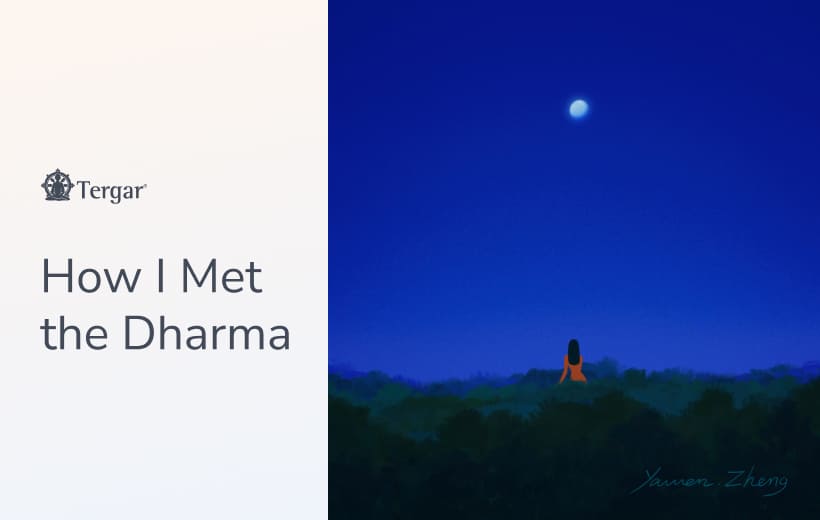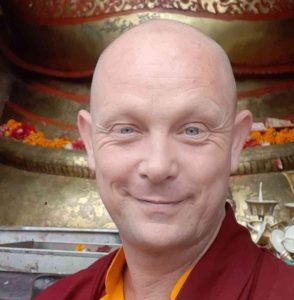Finding Freedom Beyond Addiction
By Alex Kunkhyen • 4 min read

ON REFLECTION, I’M IMMENSELY GRATEFUL that I had the experience of severe addiction. Because addiction — when you really go through it — is the most incredible opportunity for the awareness of suffering to inform the necessity for freedom.
As an actor from a young age, I thought I might find my spiritual relief in sex, drugs, and rock and roll. But I only found destruction — not just to myself, but to everyone around me. I was searching for transcendence in all the wrong places.
After years of this chaos, I found myself in treatment. In that vulnerable space, between my old life and whatever came next, grace appeared in the most unexpected form: a guy in our group I knew from our old partying days.
The two of us would attend meetings every Friday morning, then stop at the beach in Cape Town. We’d sit together, and he would meditate.
“Where can I learn to do that?” I asked him.
He mentioned the Tibetan Buddhist Centre in Cape Town, established by Akong Rinpoche. Straightaway, I enrolled in “Tranquil Mind.”
In 2003, at the University of Cape Town, I attended teachings on precious human life, karma, suffering, and impermanence. It made sense in a way that felt like remembering rather than learning for the first time. Every word seemed like coming home to a truth I had always known but had forgotten in the madness of living.
When I heard that Akong Rinpoche was coming to South Africa — he only came every four years — nothing would stop me from meeting him. Encountering him was like experiencing a human form of a mountain in steadiness, a brilliant, sky-like mind infused with sunlight. This was the first time I’d met a true master.
I had a fifteen-minute audience with him. In my naivety, I asked, “Can you see my karma, Rinpoche?” He smiled and replied, “Well, you can see your karma because you are living your karma. It’s your family, your friends, your environment, your body, everything — that is your karma.”
With those simple words, he gave me the key to understanding my own life.
When you meet a true master, what they say to you can sustain you for years.
With dharma and meditation practice, I recovered from my addiction. But the path to awakening is rarely a straight line. Work stress led to burnout, medical treatment, and a return to old patterns. The depth of that experience informed the next part of my life:
I realised that we must be broken completely before we can be remade.
I lived in a Buddhist monastery in Kathmandu, immersing myself entirely in the dharma. During this time, while in a very small Nyingma monastery, I asked the Lama residing there a question that had been burning inside me: “Is it possible to purify the karmic imprints from addiction in one lifetime?”
His response overwhelmed me. “You want happiness,” he said, “but black smoke is entering your body; it’s becoming like thick, sticky, black tar within your channels.”
This powerful image was a revelation. Here was someone who understood both my deepest longing for freedom and the precise truth of what I was doing to myself. I wept because someone finally understood not just my longing for liberation, but the exact mechanism of my self-destruction.
He offered me hope: “Like white cloth with a dirty stain, that stain can be removed; it’s not inherently part of the cloth.” This is the view of original purity, our buddha nature. The addiction, the suffering, the ‘black smoke’ are not what we truly are. They can be purified because our essential nature remains unblemished.
I began receiving profound Mahamudra teachings from my root guru, Tai Situ Rinpoche. That same year, I met Mingyur Rinpoche for the first time in a hotel in Delhi. As he moved down the hallway, wearing his flip-flops, I had an incredible experience of lightness, freedom, and liberation — an unencumbered sense of being that embodied what I had been searching for my whole life.
“Addiction — when you really go through it — is the most incredible opportunity for the awareness of suffering to inform the necessity for freedom.“
— Alex Kunkhyen
Although I met the dharma in 2003, I really came to the dharma perhaps ten years later through practicing under these sublime masters. There’s a difference between knowing about the dharma and being known by it, between studying freedom and tasting it.
I met with Mingyur Rinpoche again recently at Sherab Ling Monastery, following the completion of an intensive practice. Almost spontaneously, I said, “You’ve given me these teachings, the introduction to the nature of mind, and there is no way that I could possibly repay that kindness.”
“Yeah, that’s right,” he replied.
The incredible gift we receive through the Path of Liberation teachings continually reminds us that there is no greater love given to anyone than a master pointing out the nature of mind.
Now, 22 years later, I’m back at the same lecture hall at the University of Cape Town — this time as a fully ordained monk, a director of Tergar South Africa, hosting Mingyur Rinpoche for the first time on African soil. For the first time in history, a Tibetan master will give the pointing out instructions in a retreat context on this continent.
Life, it seems, loves her circles — and what magical circles they can be.
Read about the Tergar South Africa retreat HERE.
August 2025

Alex Kunkhyen is a fully ordained monk in the Tibetan Buddhist tradition and a director of Tergar South Africa. A former Cape Town actor and filmmaker, he discovered meditation through personal struggles with addiction in 2003, beginning a transformative journey that led him from the entertainment industry to monastic life.
He now divides his time studying, practising and doing retreat in Northern India and Nepal, and serving the local Tergar community in South Africa.
Learn meditation under the skillful guidance of world-renowned teacher Yongey Mingyur Rinpoche at your own pace.


“I could see how the people at the hospice have challenges, just like others, and they don’t have access to meditation.” – Stefan Markov

In popular imagination, Buddhism is often seen as equating life with suffering, but that’s not really accurate. In fact, Buddhism sees a lot of suffering as completely avoidable.

“A big highlight was going around Nepal and seeing all these incredible places that were dedicated monasteries, temples, shrines, and caves, where our great meditation ancestors practiced.” — Christopher Baxter
If you enjoyed reading our articles, please join our mailing list and we’ll send you our news and latest pieces.